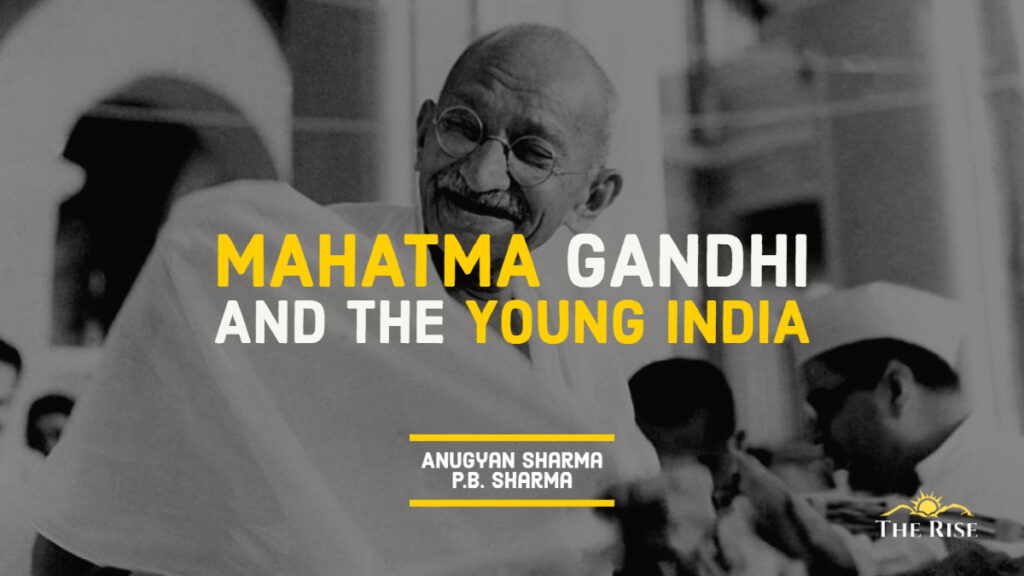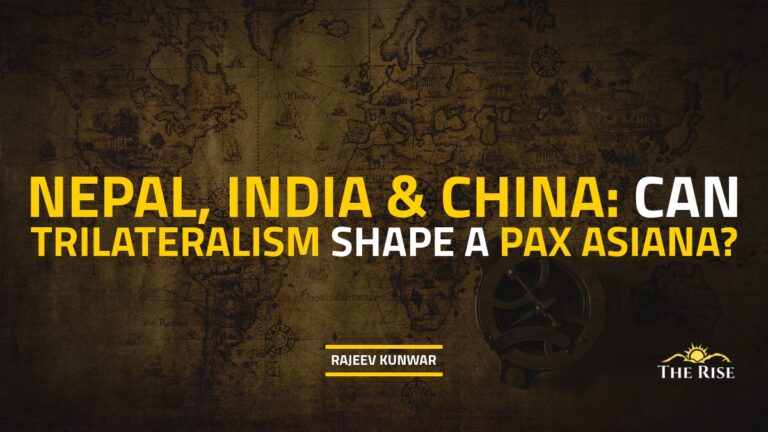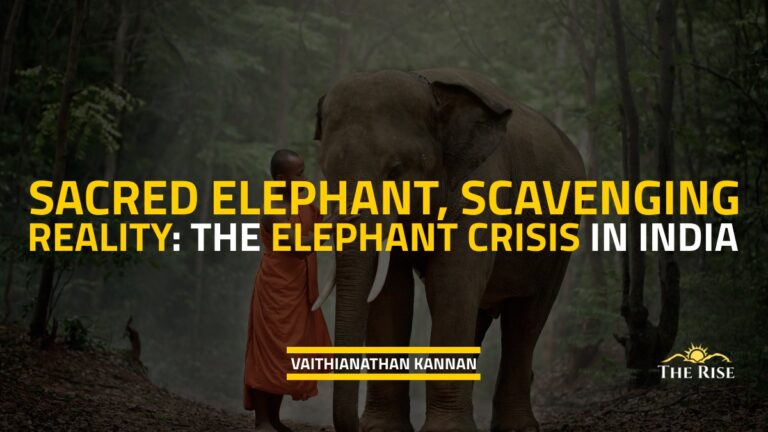As the nation celebrates Mahatma Gandhi’s birthday this year, it is important to reinstate the larger vision of Swaraj of the Father of the Nation that advocated for inclusive and sustainable development based on the principles of education with character, work with ethics, and professional morals and promotion of mass entrepreneurship to ensure zero unemployment for a populous country like India. For Mahatma Gandhi, mere urbanization was no answer for development as the soul of India lives in its villages. As such his vision of sustainable development need to be realized in modern times of technology innovations by creating clusters of high-tech smart villages so the cause of economic growth and environmental sustainability can be addressed with clarity and with conviction. In this article, the authors have presented a strong case for making the vision and philosophy of Mahatma Gandhi relevant to Young India, as they are the future and have the potential to create the India of our dream.
The 153rd birth anniversary of the father of the nation, Mahatma Gandhi should bring a renewed inspiration and hope to young India to nurture peace, harmony, righteous conduct, and a way of life akin to a blissful new world that we all are looking forward to. Specially now, that India is cruising on the pathways of growth and development, powered by the innovative genius of young India, the positive environment created by the programs and policies of New India and the infrastructure push by the government of India. It is high time that we, as a nation, begin to invest on people in building their mindset tuned to peace, harmony, responsibility, simplicity, and sustainability.
India’s impressive recovery from the prolonged slowdown of COVID-19 has truly mesmerized the world, as the advanced nations are still reeling under the great economic recession. It is, therefore, important for a nation like India, that on one hand, the wheels of engines of economic growth should continue to run fast, on the other hand, the innovative genius of young India should propel the chariot of inclusive and sustainable development by engaging themselves deep into scientific advancements, technology innovations and social businesses that shall provide a renewed thrust to the Nation’s economy and a major boost to social and environmental sustainability.
Gandhi’s Larger Vision of Swaraj
It is also important to realize that for the young India prosperity alone would have no meaning unless it is associated with engagement in useful productive work and that too in an environment of blissful living in harmony and peace. Mahatma’s larger vision of Swaraj was intrinsically associated with the infinite opportunities to manifest the potential of the vast population of India, that had practised, for millions of years and presented to the world, a life philosophy of inclusive and sustainable economic growth with inbuilt layers of happiness and social cohesion. For the Indian mind, the purpose of life was not limited merely to material gains but was integral to living a life full of divine bliss and inner peace.
Mahatma’s emphasis on engaging people of all walks of life into mass entrepreneurship that promotes micro, small, and medium enterprises based on productive utilization of the vast talent pool and natural resources, available in a tropical country like India was conceived from the point of view of his deep concern for inclusiveness of the economic growth. This was in contrast with the models of economic growth practised by the western world based on mass production in economic zones, concentrated in the pockets close to megacities and metropolitan towns that India became so accustomed to during the last 75 years of independent India.
Mass Entrepreneurship so Important for India
The young India of our dream requires reinstating the relevance of Mahatma’s vision of mass entrepreneurship and autonomous villages in today’s context of smart high-tech village clusters in rural India to create an abundance of opportunities for the rural youth to find gainful engagement in productive employment while living in harmony with nature in their natural habitat. Mere emphasis on increased urbanization and the assumption that the economic growth engines only revolve around megacities and towns would continue to create great economic inequality besides creating heaps of urban poverty and great stresses on civic infrastructure.
Mahatma’s emphasis on engaging people of all walks of life into mass entrepreneurship that promotes micro, small, and medium enterprises was conceived from the point of view of his deep concern for inclusiveness of the economic growth
You May Like: J Sai Deepak’s ‘India that is Bharat’ Attempts a Fresh Look at the Issue of Coloniality and Decoloniality
Bridge Economic Inequality and Focus on Environmental Health
It must, however, be clearly understood that alongside economic resurgence, we need to succeed in bridging the great economic inequality and take care of the heaps of unemployment that the current economic development models have become accustomed to. It sounds strange, that in the country of Mahatma Gandhi, the rich are becoming richer and the poor even poorer, despite the fact that India is emerging as a great place for economic resurgence.
Besides economic inequality, we need to pay greater attention to the environmental health and preservation of vital biodiversity. It is important to respect diversity as the principle of existence. Our forefathers respected nature as a great provider of all that we need and were conscious to maintain the natural resources and use them wisely with a great sense of sustainability. Mahatma Gandhi’s emphasis on sustainable consumption and that “there is enough for everyone’s need but not for everyone’s greed” requires reinstatement to reverse the current trends of accelerated consumption and accumulated possessions beyond one’s need.
Mahatma Gandhi’s emphasis on sustainable consumption and that “there is enough for everyone’s need but not for everyone’s greed” requires reinstatement to reverse the current trends of accelerated consumption and accumulated possessions beyond one’s need.
Also Read: Caste-based Reservation and Discrimination: An Equitable Social Order?
Integrate Ethics and Professional Morals in Education
India’s great economic resurgence post-COVID-19 should be taken as an opportunity to redesign the strategic pathways for growth and sustainable development as also to integrate with utmost sincerity work ethics and professional morals in all aspects of economic and social activities. Bringing ethics and morality into the workplace and in public life shall go a long way to address issues of increased productivity, pollution, and corruption.
For Mahatma Gandhi, education was an important vehicle for transformation of the society and the nation. We need to learn from Mahatma Gandhi and instil morals and ethics in all aspects of education to nurture “Knowledge with Character” which in addition to nurturing capabilities, will create responsible citizenship and a law-abiding civil society, which is clearly a precondition of growth and advancement of nations around the world in the digital age. Somehow this emphasis of Mahatma Gandhi on the integration of ethics and morals in education was undermined. However, it is heartening that the NEP-2020 has mandated the integration of ethics, professional morals, and universal human values in education at all levels, including in the universities and institutions of higher learning.
We already see an increased focus on ethics and morality being implemented in universities in the United States, with many undergraduate engineering students having to take seminars and workshops on professional morals and ethics as a core requirement. This allows budding engineers to learn the responsibility which comes with being a professional in the 21st century. India should also encourage ethical training at a young age to shape future minds who will not only meet the demands of the industry and corporate but do so in all aspects of their behaviour and conduct.
Also Read: Women Economic Empowerment by the Private sector: A Beacon of Hope?
Shift to Vegetarian Diet Makes Civic Sense
Besides education, a major shift is needed in creating a mass movement for the promotion of a healthy vegetarian diet totally free from the killing of animals and creatures for food. It makes civic as well as business sense to shift to vegetarian food, now that we have more clearly understood the nexus between climate change and the farming of animals and their killings for food. For Mahatma Gandhi, it was a deadly sin to kill animals for food. Nonviolence and peace go together in creating a sustainable society that protects both the people and the planet and maintains the biodiversity so important for our healthy existence.
For Mahatma Gandhi, India was and still is the Shantidoot and a country practising the philosophy of ‘Do not Kill’, referred to as Ahimsa by the Vedic Seers and sages from time immemorial. It also makes no sense whatsoever to promote the sale of liquor in every nook and corner of the country, including in the glittering showrooms on highways and expressways. While there is a growing trend in the advanced nations of the world towards a plant-based vegetarian diet and a major cut in consumption of alcohol, India accounts for one in every two bottles of whisky sold in the world. We need to reinstate Mahatma Gandhi’s philosophy that a healthy mind needs a healthy body fed by a sattvic, vegetarian diet to mentor young India which is mindlessly turning in great numbers towards meat-based food and the tamsik alcoholic drinks.
Also Read: Major Shift to Vegetarian Diet Needed for a Healthy Life and Mitigating Climate Change
While there is a growing trend in the advanced nations of the world towards a plant-based vegetarian diet and a major cut in consumption of alcohol, India accounts for one in every two bottles of whisky sold in the world.
Making Mahatma Gandhi more relevant to the creation of New India of our dream shall make education a vehicle for the transformation of a man into a human and shall create healthy minds tuned to fair prosperity, righteous conduct, and responsible citizenship that shall also ensure that the democracy in true sense functions as the government for the people.
Quoting Mahatma Gandhi’s own words, “Non-violence is the greatest force at the disposal of mankind. It is mightier than the mightiest weapon of destruction devised by the ingenuity of man“. Long live Mahatma Gandhi in the hearts and minds of people around the world!
Also Read: Abuse and Neglect in Orphanages and Care homes: A Double Whammy
Disclaimer: The views expressed in this article are of the authors solely. TheRise.co.in neither endorses nor is responsible for them. Reproducing this content without permission is prohibited













Goodmorning Sir
I have gone through this coveted thoughts of yours . You have connected the visions of The Father of the Nation in terms of Swaraj to India’s efforts towards Sustainable Society for survival of humanity bridging inequality in economic , education , environmental ;etc.
Such coveted Article authored by you and Mr Anugyan Sharma and sharing with us on the 153rd birth anniversary of Mahatma Gandhi , the Father of the Nation certainly gives us a wake-up call to rise to do something to achieve sustainable society for future India .
With respectful regards
Dr HRPYadav n Family
Pingback: North East Festival-A Roadmap To Domestic And Global Ties - TheRise.co.in